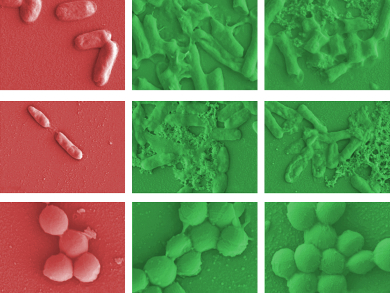In the fight against drug-resistant pathogens, new antibiotics and antimicrobials are urgently needed. Antimicrobial peptides (AMPs) have been considered as an alternative to traditional antibiotics. They kill bacteria by disrupting their cell membrane. However, they are expensive to manufacture and have insufficient stability in vivo. AMP mimics which consist of synthetic polymers or oligomers could solve these problems.
Haibin Su, Nanyang Technological University, Singapore, Yugen Zhang, Institute of Bioengineering and Nanotechnology, Singapore, and colleagues have developed imidazolium oligomers with terminal alkyl groups (pictured below) which kill bacteria using this approach. The team tested their performance against the pathogens Staphylococcus aureus, Escherichia coli, Pseudomonas aeruginosa, and Candida albicans and compared it to antibiotics that are commonly used against these microbes, such as vancomycin. The oligomers showed comparable or better performance in killing the bacteria.

The selectivity of the oligomers for bacterial over mammalian cells was tested by measuring their propensity to induce hemolysis. The compounds with shorter aliphatic sidechains up to C10 showed selectivity indices in a safe range. The oligomers are fast-acting, and kill 99.9 % of the pathogens within two minutes. Previously reported antimicrobials such as AMPs and silver nanoparticles do this on a time scale of minutes to hours.
According to the researchers, the properties of these imidazolium materials suggest potential for their use as an antimicrobial agent, particularly in sterilization and other health care applications.
- Ultrafast Killing and Self-Gelling Antimicrobial Imidazolium Oligomers,
Siti Nurhanna Riduan, Yuan Yuan, Feng Zhou, Jiayu Leong, Haibin Su, Yugen Zhang,
Small 2016.
DOI: 10.1002/smll.201600006




Seems to be promising research in pharma-related synthetic organic chemistry. May open new commercial drug class.